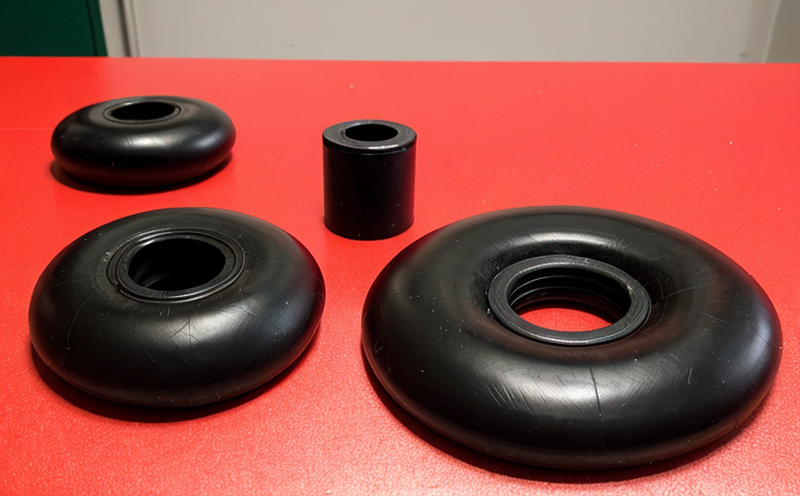ASTM D471 Oil Resistance Testing of Rubber
The ASTM D471 standard specifies procedures for determining the resistance of rubber to oils, greases, and other petroleum-based hydrocarbons. This test is critical in industries where materials must withstand exposure to harsh environments or chemicals over extended periods. The procedure involves exposing rubber specimens to various oils under controlled conditions and evaluating their physical properties before and after the test.
The primary purpose of ASTM D471 testing is to assess how well a particular rubber compound will perform in applications where it might be exposed to oil, grease, or other petroleum-based products. The test helps ensure that rubber parts used in automotive, aerospace, and industrial sectors meet strict durability and performance standards.
The standard provides detailed guidance on specimen preparation, testing conditions, and evaluation methods. Specimens are typically cut into specific shapes according to the test requirements, which may vary depending on the intended application. The specimens are then immersed in a specified oil at a controlled temperature for a set period of time. After removal from the oil, the specimens undergo various mechanical and physical property tests.
The ASTM D471 standard covers several types of oils, including petroleum-based mineral oils, synthetic hydrocarbons, and blends thereof. The test results are used to determine the degree of swelling or shrinkage, hardness change, and tensile strength loss after exposure to the oil. These parameters provide insights into the rubber's resistance to deformation and chemical attack.
The ASTM D471 procedure is widely used in industries such as automotive, aerospace, and manufacturing. In these sectors, materials that come into contact with oils or greases must maintain their integrity and performance over time. By conducting ASTM D471 testing, manufacturers can ensure that their rubber components will withstand the harsh conditions they are likely to encounter during use.
For instance, in automotive applications, rubber seals and gaskets may be exposed to engine oils or transmission fluids, which can degrade if not properly formulated. ASTM D471 testing helps verify that these materials will perform reliably under real-world conditions. Similarly, in aerospace applications, where components must withstand extreme temperatures and environmental stresses, ASTM D471 testing ensures that rubber parts are capable of maintaining their properties over the long-term.
The test is also valuable for quality assurance and product development processes. By comparing the results of ASTM D471 tests on different rubber compounds or formulations, engineers can identify the most suitable materials for specific applications. This information can be used to optimize formulas and improve overall material performance.
Applied Standards
The ASTM D471 standard is one of several industry standards that address rubber oil resistance testing. Other relevant standards include ISO 6502, which specifies methods for determining the resistance to swelling and hardness change in rubbers by contact with hydrocarbons; and EN 13980, which provides guidelines for assessing the performance of rubber materials used in automotive applications.
ASTM D471 specifically focuses on petroleum-based oils, while ISO 6502 covers a broader range of hydrocarbons. Both standards are essential for ensuring that rubber products can withstand exposure to various types of fluids without significant degradation. By adhering to these standards, manufacturers can ensure that their products meet the highest quality and performance expectations.
EN 13980 adds another layer of specificity by addressing automotive applications specifically. This standard ensures that rubber components used in cars, trucks, and other vehicles are capable of withstanding the harsh environments they encounter during operation. By following these standards, manufacturers can guarantee that their products will perform reliably under real-world conditions.
Benefits
- Ensures Product Integrity: ASTM D471 testing helps verify that rubber materials remain intact and functional after exposure to oils, greases, or other petroleum-based products.
- Promotes Durability: By identifying the optimal rubber formulations for specific applications, manufacturers can improve the longevity of their products.
- Facilitates Regulatory Compliance: Adhering to industry standards like ASTM D471 ensures that materials meet regulatory requirements and perform as expected in real-world conditions.
- Saves Time and Costs: Early identification of potential issues through ASTM D471 testing can prevent costly rework or product failures later in the development process.
- Enhances Safety: Ensuring that rubber components do not degrade under expected conditions reduces the risk of accidents or equipment malfunctions.





